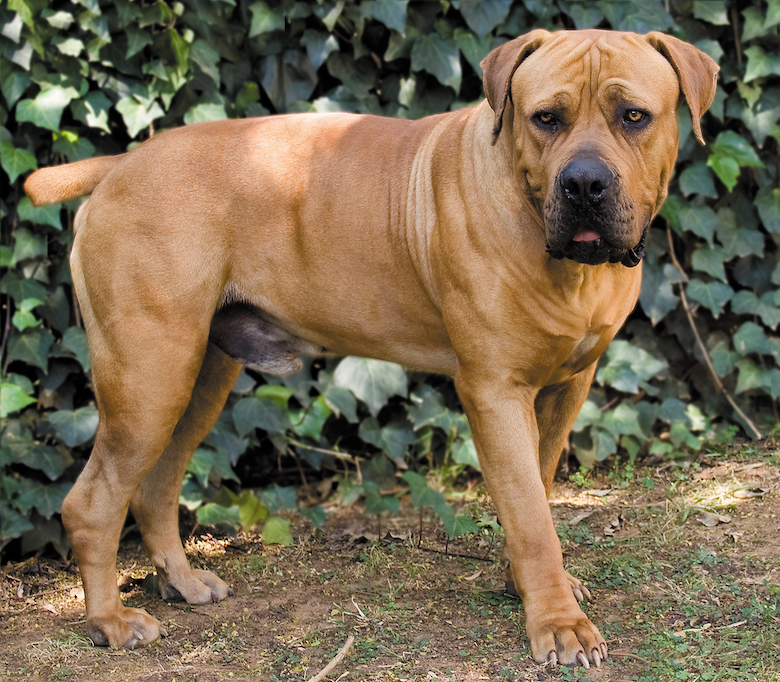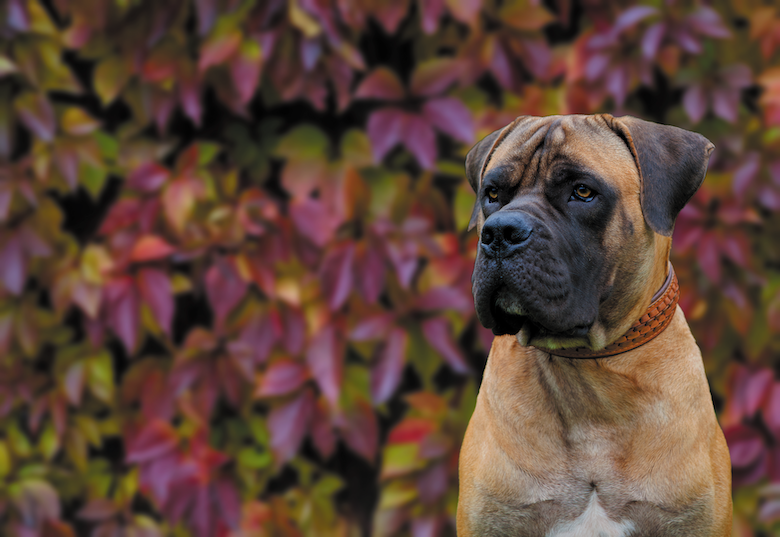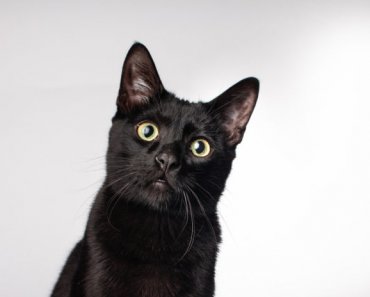Developed as a guardian and homestead dog for South African settlers, the fearless Boerboel (farmer’s dog) was bred for toughness. In a day’s work he was expected to ward off wild predators, deter intruders and assist in the hunt. These days, the confident Boerboel — a breed best for experienced dog owners — remains steadfast in his protection, love and desire to work for family. In general, his lion chasing days are over!
South African origins
Bred by Dutch and English colonists in South Africa, the African Boerboel was developed from strong Mastiff-type working dogs. These early Boerboels defended against predators and assisted in hunts, often tracking and holding game. During the Great Trek (in the early 19th century) of Dutch-speaking people in southern Africa, Boer dogs accompanied their families and contributed to the Boerboel’s development. The Boerboel was also cross-bred with Bull Mastiffs, longer-legged Bulldogs and likely local indigenous dogs. The exact history is shadowy, but the Boerboel developed into a powerful protector and companion.

Photo: lienkie | Getty Images
Watchdog par excellence
The confident Boerboel straightaway notices the arrival of any unknown animal or human. Not surprisingly, he is typically reserved with newcomers in the home or out in the world. Early and frequent socialization is a must and helps the young Boerboel distinguish friendly guests from intruders. Frequent new people meet and greets cultivate the maturing Boerboel’s sociability. And the more a Boerboel pup experiences positive interaction, the more clarity and conviction he’ll have for identifying real danger when he’s grown.
Because the Boerboel is strong and tough, breed-specific legislation has targeted the breed. Overseas, the Boerboel is banned in some countries and cities (such as Geneva). Here, some cities, apartment complexes and homeowners associations may restrict Boerboel ownership. Prospective owners should check with their cities, HOA’s or landlords before bringing the loyal Boerboel home.
Time for school
Intelligent but independent, Boerboels need structured obedience training and regular testing of their response to commands with distractions present. The breed requires both mental and physical exercise; focused work and training help him channel his work and protection drives. Although they don’t require all-day hikes, Boerboels need daily walks, playtime and focused training. The breed excels in many sports, including stock work, weight pull, obedience, rally, agility and protection sports.
The self-assured Boerboel doesn’t often play casually in dog parks with unknown dogs. Because he was developed to scare off intruding animals, he’ll sometimes exhibit a confrontational attitude with new dogs, especially on his property. Positive experiences in group training classes mitigate his suspicion of other dogs, but owners should be cautious with any same-sex encounters.
Many Boerboels do well with cats in the home, as well as livestock. Known for cherishing the family’s children, the Boerboel (in the hands of an experienced dog owner) will become a devoted companion. His heart is one of his strongest muscles!

Photo: EstrellaBuena | Getty Images
Boerboel basics
Weight: 150 to 200 pounds
Life span: 9 to 11 years
Coat: Short, dense, shiny and smooth.
Color: Brindle and all shades of brown, red or fawn (with limited white patches on legs and chest); piebald (with white not exceeding 33%)
No Powder Blue: A “powder coat” Boerboel is a blue (steel gray) dog that appears to be dusted in powder. Such a coat is not recognized as breed standard.
Grooming: Relatively easy to groom coat. Regular brushing suffices.
Shedding: The Boerboel is an average shedder. Shedding is a good thing, by the way, for it allows old, dead hair to fall out and new hair to grow in!
Best For: Experienced owners (either families or singles) with time for extensive socialization and training.
Possible Health Issues: Hip dysplasia, eyelid issues
Proposed Breed Quote: “Happy is he who dares courageously to defend those he loves.”
How Do You Say That? Boerboel roughly translates as either “farmer’s dog” or “Boer’s dog.” The breed should be pronounced more like boo-er-bool than bur-bull.
Spell Check: Along with being frequently mispronounced, the Boerboel is frequently misspelled as Boerbul, Boerbull and Borbull, to name but a few!


























